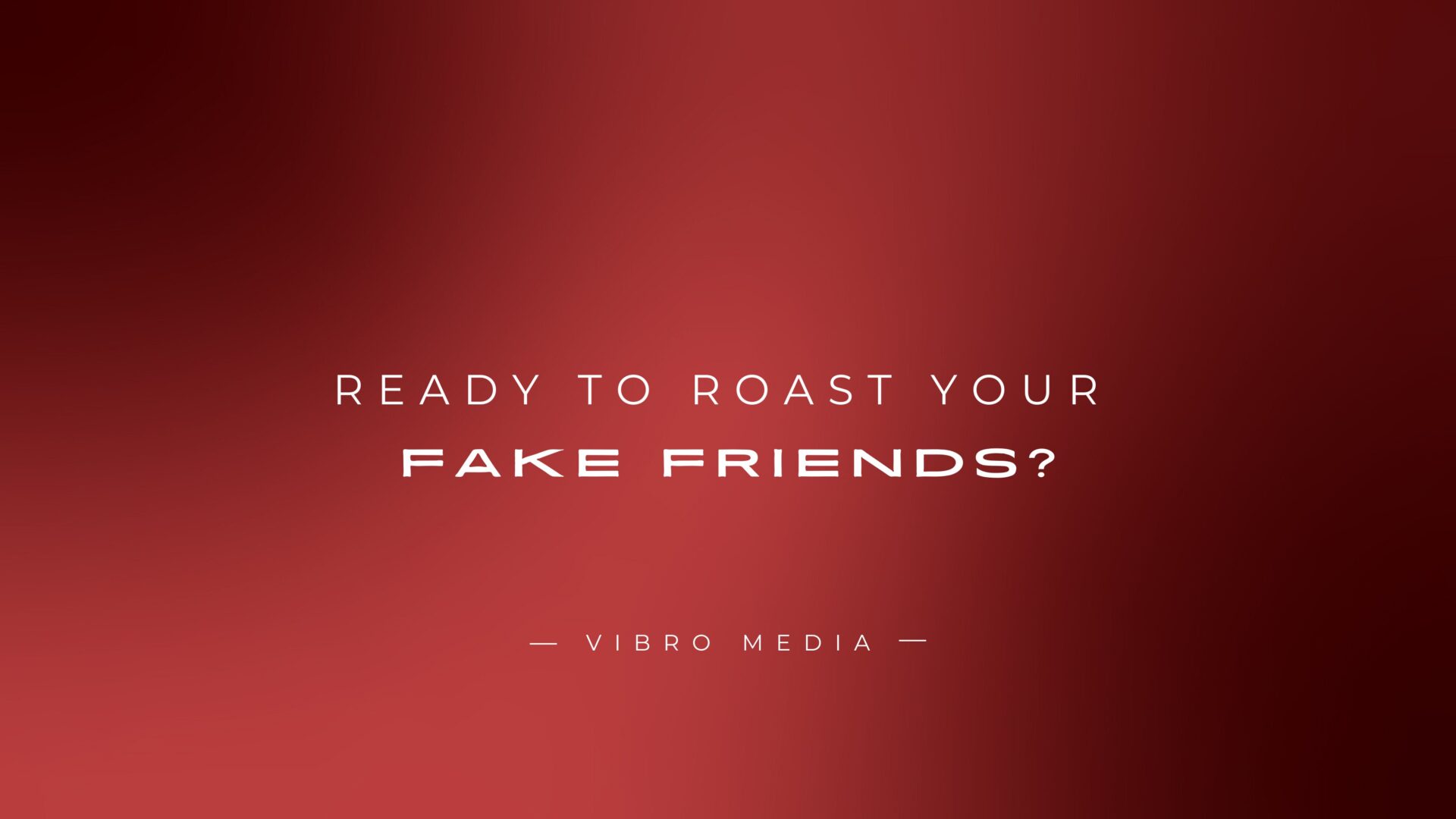Friendships are one of life’s greatest treasures. But let’s be honest—sometimes, we are entangled with people who aren’t true friends. They’re just pretending, putting on a mask of friendship while secretly undermining us. These people are known as fake friends. If you’re fed up with these phonies, it might be time to serve them a slice of humble pie or roast them, not in a mean-spirited way, but in a way that gets your point across with a touch of humor and wit.
So, how exactly do you roast your fake friends? Buckle up because we’re diving deep into calling out these two-faced companions with style.
Understanding Fake Friends
What Are Fake Friends?
Fake friends are the people who smile to your face but are quick to talk behind your back. They’re only around when it’s convenient for them, often leaving you in the lurch when you need them the most. These friends are more interested in what they can gain from the friendship rather than valuing you. Essentially, they’re more concerned with themselves than the relationship.
Signs You Have Fake Friends in Your Life
Identifying fake friends isn’t always straightforward, but there are some telltale signs to watch out for:
- Inconsistent Behavior: One moment, they’re your best buddy, and the next, they act like they barely know you.
- Lack of Support: Fake friends are rarely there when you need emotional or practical support. They disappear at the first sign of trouble.
- Self-Centered Conversations: Notice how the conversation always revolves around them? That’s a red flag.
- Backhanded Compliments: They might compliment you, but there’s always a subtle dig hidden beneath their words.
If any of these behaviors sound familiar, you might have a fake friend on your hands.

200+ Roasts For Fake Friends
Trust Issues
- Trusting you was like handing a match to a pyromaniac.
- You could sell ice in winter, but I’d never buy your loyalty.
- You’re the reason trust falls are banned at team-building events.
- If I had a dollar for every time you broke my trust, I’d be rich enough to buy better friends.
- You’re like a password that gets hacked the first time it’s used.
- You say, ‘Trust me,’ but all I hear is, ‘Watch your back.’
- You’ve got more cracks than a shattered mirror, and trust is just one of them.
- Trusting you is like leaning on a broken chair—one wrong move, and it’s all over.
- You’re the reason I keep my guard up around everyone now.
- Whenever I trusted you, it felt like I was handing you a knife, and you always took the chance to use it.
Two-Faced Behavior
- Your two faces must get tired from all the switching.
- You’re like a coin—two sides, and I can never tell which one’s up.
- I can never tell which version of you I’m getting today—the friend or the fake.
- You’re so good at being two-faced you could star in a soap opera.
- If being two-faced was a sport, you’d have a trophy case full of medals.
- You’ve got more sides than a Rubik’s cube, but none add to a real friend.
- You switch sides faster than a politician before an election.
- Your two-faced behavior makes Dr. Jekyll and Mr. Hyde look like amateurs.
- I’d call you out on your two-faced behavior, but which one of you would show up to argue?
- You should sell tickets for your two-faced act—it’s got more drama than a Broadway show.
Backstabbing
- With friends like you, who needs enemies?
- You’re the kind of friend who brings a knife to a back hug.
- It’s amazing how you can smile on my face while aiming for my back.
- You’re proof that the worst betrayal always comes from someone you trust.
- You’ve got the backstabbing thing down to an art form. Too bad you’ll never master loyalty.
- You stab so many backs; I’m surprised you still have friends to betray.
- Your specialty is stabbing backs and acting like the victim—quite the talent.
- You’ve stabbed me in the back so many times it’s starting to look like a pincushion.
- You must be exhausted from carrying around all those knives you’ve used on friends.
- It’s funny how the one person I trusted the most was the sharpest blade in my back.
Disloyalty
- Your loyalty is like a phone with no signal—completely useless when I need it most.
- If disloyalty were a sport, you’d have more gold medals than Michael Phelps.
- You’re so disloyal; I wouldn’t trust you to hold a door open, let alone my secrets.
- You’re like a weather vane—always changing direction to suit your convenience.
- I’ve seen more loyalty from a vending machine.
- Your loyalty is like a flickering light bulb—never consistent or unreliable.
- The only thing more fickle than your loyalty is a broken compass.
- Whenever you talk about loyalty, do you know what the word means?
- You’ve made disloyalty an art form; unfortunately, you’re the only one impressed by your work.
- If your loyalty were a bank account, it’d be overdrawn and bankrupt.
Superficial Friendship
- Our friendship was like a summer romance—fun while it lasted, but fake.
- You’re like a social media filter—everything looks great from the outside, but it’s all just for show.
- I didn’t realize I was signing up for a reality show with you as the star of ‘Superficial Friends.’
- Our friendship is like a fashion trend—outdated and never really had any substance.
- You put more effort into your Instagram posts than into our friendship. Thanks for the clarity.
- You’re like a glossy magazine cover—nice to look at but empty on the inside.
- If you were a product, you’d come with a ‘for show only’ label.
- You’d win an award for ‘Best Fake Friend in a Supporting Role.’
- Our friendship had all the depth of a kiddie pool—shallow and easily forgotten.
- You’re the kind of friend who looks good in pictures but vanishes in real life.
Selfishness
- You’re the type of friend who thinks ‘sharing’ is just a word in the dictionary.
- Your selfishness could fill a room—if only it didn’t make everyone else feel so small.
- You’re like a black hole of generosity—nothing ever escapes your selfish grasp.
- If there were an award for selfishness, you’d be the reigning champion.
- You’re so self-centered that you’d need a telescope to see beyond your needs.
- I’ve seen more selflessness from a vending machine giving free snacks.
- Your idea of friendship is like a one-way street—only your needs matter.
- You’re so wrapped up in yourself you could win a medal for ‘Most Self-Centered Friend.’
- Being around you is like being in a constant state of déjà vu—same selfish behavior, different day.
- If your selfishness were an art form, you’d have a gallery full of masterpieces.
Disappearing Act
- You disappear so often that I’m starting to think you’re part of a magic act.
- Your idea of being present is like a ghost—there one minute, gone the next.
- You could win an award for ‘Best Vanishing Act’—and no one would notice you were gone.
- If you were a magician, your signature trick would disappear when I need you most.
- Your disappearing act is so impressive; you’ve got an invisibility cloak.
- You’re like a mirage—promising to be there but always fading away when it counts.
- Every time I turn around, you’re like Houdini—escaping the scene before I realize it.
- Your skill at disappearing is remarkable. Too bad it’s not matched by your commitment to friendship.
- If you were a superhero, your power would vanish right when needed.
- Your disappearing act is so flawless that it should come with a ‘now you see me, now you don’t’ warning.
Fake Support
- Your support is like a placebo—it looks good but doesn’t help.
- You offer to support the way a mirage offers water—completely useless when needed.
- Your version of support is showing up in the background while I do all the heavy lifting.
- You’re great at pretending to support me—if only the actions matched the words.
- You offer support like a coupon with no expiration date—always promising but never delivering.
- Your support is so fake; even a mannequin would look more genuine.
- I’ve seen more support from a pile of pillows—at least they don’t make empty promises.
- Your so-called support is as reliable as a paper umbrella in a storm.
- If your support were a product, it’d come with a ‘some assembly required’ disclaimer.
- Your fake support is impressive—like a stage performance where you’re the only audience.
Jealousy
- Your jealousy is so blatant you might as well be wearing it as a badge.
- It’s cute how your jealousy makes you try so hard to tear me down—it’s almost endearing.
- Your jealousy is like a bad perfume—strong, unpleasant, and hard to ignore.
- You wear your jealousy like a fashion statement—loud, obvious, and completely unnecessary.
- I didn’t realize my success would trigger your full-on jealousy meltdown.
- Your jealousy is so transparent you might as well have a sign that says ‘Envious and Proud.’
- It’s impressive how your jealousy turns every compliment into a competition.
- Your jealousy is like a recurring bad dream—annoying and impossible to escape.
- Seeing you jealous is like watching a dramatic, over-the-top, and utterly unconvincing soap opera.
- Your jealousy is so intense, like watching a train wreck—you just can’t look away.
Gossiping
- You gossip so much, I’m surprised you have yet to start your news channel.
- You’d be a millionaire if talking behind people’s backs was a profession.
- You’d be a great journalist—if only spreading rumors was a respectable career.
- Your gossiping is so relentless that I’m surprised your lips aren’t permanently in motion.
- I didn’t realize your favorite hobby was talking about everyone who’s not around.
- You gossip like it’s your job—too bad it’s one no one actually wants to pay for.
- Your talent for gossiping could make you the star of a reality show called ‘Rumor Mill.’
- You’d win gold medals in gossiping if it were an Olympic sport.
- If gossip were a currency, you’d be my richest person.
- You have a real gift for turning every conversation into a game of ‘Who Can I Talk About Next?’
Manipulation
- You manipulate situations so well that I’d swear you were training for a career in puppet mastery.
- Your talent for manipulation is impressive—if only it came with a manual on how to be a decent friend.
- You’re so skilled at manipulation that you could teach how to use people for personal gain.
- Your idea of friendship involves using people like pieces on a chessboard—except you’re always the queen.
- If manipulation were an art form, you’d be Picasso—if Picasso painted nothing but deceit.
- You’re so good at manipulation; I’m surprised you haven’t tried to sell it as a superpower.
- Your manipulation is like a complicated maze that keeps people lost and confused.
- You should get an award for ‘Best Use of People in a Supporting Role’—your manipulation skills are that good.
- The way you manipulate situations, it’s like you’re auditioning for a role in a drama series called ‘Fake Friends.’
- You’ve made manipulation look effortless, but it’s only impressive until someone sees through it.
Fair-Weather Friends
- You’re like a sunny day—here when everything’s great and gone when the clouds roll in.
- You show up like a fair-weather friend—only when it is convenient for you.
- If being a fair-weather friend was an Olympic sport, you’d have a gold medal by now.
- You’re like a good weather app—always promising sunny days but never around when the storms hit.
- Your friendship is as reliable as a weather forecast—great when it’s sunny but nowhere to be found when it rains.
- I’d trust you to be a fair-weather friend, but I’d need to check the forecast first.
- You’re the type of friend who only shows up for the photo ops and vanishes when it’s time to get real.
- If you were any more of a fair-weather friend, you’d be a seasonal decoration.
- You’ve perfected the art of being a fair-weather friend—always there for the fun, never for the tough times.
- You’re so good at being a fair-weather friend I almost expect you to come with a weather warning.
Broken Promises
- Your promises are like paper—easily torn and completely worthless.
- I’d trust your promises about as much as I’d trust a leaky boat to stay afloat.
- Your promises are like magic tricks—disappearing right before my eyes.
- You’re a pro at making promises and an expert at breaking them.
- Your promises have a shorter shelf life than milk left in the sun.
- I’d need a time machine to find your promise that hasn’t been broken.
- Your promises are flimsy, like a house of cards built on sand.
- You make promises like a broken record—repeating the same empty words repeatedly.
- I’d never need to hear another one if I had a dollar for every broken promise from you.
- Your promises are like a mirage—always appearing but never actually arriving.
Attention-Seeking
- You’re like a toddler—always throwing a tantrum when you don’t get the attention you want.
- Your need for attention is so loud it’s like a siren going off in a quiet room.
- You seek attention the way a magician seeks applause—constantly and loudly.
- If attention-seeking were a talent show, you’d be the star of every episode.
- You’re so attention-seeking that you’d interrupt your funeral to make sure everyone’s watching.
- You’re like a billboard for ‘Look at Me!’—constantly demanding attention, even if unnecessary.
- Your attention need is overwhelming, and I’m surprised you haven’t started charging for it.
- You’d give a master class on attention-seeking if only people had the patience to attend.
- Your attention-seeking behavior is so obvious; it’s like wearing a neon sign that says ‘Look at Me.’
- You’re like a broken record—always playing the same tune of ‘Look at me’ and never getting old.
Fake Apologies
- Your apologies are like coupons—nice to have but never worth anything.
- You give fake apologies like candy—sweet words with no real substance.
- If apologies were a currency, yours would be counterfeit.
- Your apologies are so insincere; they come with an expiration date.
- You offer apologies like a magician offers tricks—more show than substance.
- Your apologies are like a bad movie—full of promises but ultimately disappointing.
- If there were an award for fake apologies, you’d have a trophy case full of them.
- Your apologies are about as genuine as a stage performance—full of flair but completely lacking in truth.
- I’d rather you not apologize if it will be as fake as your concern.
- Your fake apologies are like a mirage—promising a resolution but never delivering it.
Frenemies
- You’re the kind of friend who’s also my biggest competitor—always cheering me on with one hand while plotting against me with the other.
- You’ve mastered the art of being a frenemie—smiling in my face while undermining me behind my back.
- If being a frenemy was a sport, you’d have a gold medal for ‘Best Fake Friend.’
- You’re like a wolf in sheep’s clothing—pretending to be friendly while waiting for the perfect moment to strike.
- You’ve perfected the frenemy act—being supportive only when it suits your agenda.
- Your idea of friendship is like a soap opera—full of drama and hidden motives.
- You’re the best at being a frenemy—always there with a smile while secretly plotting your next move.
- Having you as a friend felt like having a shadow constantly plotting my downfall.
- You’re so good at being a frenemy, I’d swear you took lessons from a textbook titled ‘How to Fake It 101.’
- Your friendly facade is so convincing that it’s almost a shame there’s so much deception lurking beneath.
Lies and Deceit
- You’re like a walking lie detector—only you’re lying, and everyone else is detecting it.
- If lies were a sport, you’d be the world champion—always finding new ways to cheat and deceive.
- You lie so often that I’d need a manual to keep up with all your different stories.
- Your talent for deceit is impressive—like a magician whose tricks are always just a little too obvious.
- You’re a master of lies and deceit, but you’re so obvious that even a blind person could see through you.
- If there were an award for ‘Best Deceiver,’ you’d have a trophy with your name.
- Your ability to spin lies is so advanced I’m surprised you don’t have a PhD in deceit.
- Your deceit is so elaborate I’m starting to think you’ve got a script for every occasion.
- You’re like a broken record of lies—repeating the same deceitful tune repeatedly.
- The only thing more predictable than your lies is how you try to cover them up.
Envy and Sabotage
- Your envy is so thick it’s practically a fog that clouds every interaction.
- You’re so busy sabotaging my success that I’d swear you’re working for the competition.
- Your envy is so obvious; it’s like you’re wearing a neon sign that says ‘Jealous of You.’
- You try to sabotage my achievements with the subtlety of a bull in a china shop.
- Your envy is like a bad smell—pervasive and impossible to ignore.
- You’re so consumed by envy that you’d rather see me fail than succeed.
- Your sabotage attempts are so clumsy I’m surprised you haven’t accidentally sabotaged yourself.
- You’re so envious that you’d rather throw obstacles in my path than focus on your growth.
- Your envy is so intense it’s like watching someone try to undermine their happiness out of spite.
- The way you sabotage my success makes me wonder if you’re secretly auditioning for a role in a drama about jealousy.
Emotional Drain
- Being friends with you is like constantly draining my emotional energy—just when I think I’m recharged, you show up.
- Your idea of friendship is like a never-ending therapy session where I only give.
- I didn’t realize I signed up for an emotional rollercoaster with you as the ride operator—always thrilling but never-endingly exhausting.
- You’re like a black hole of emotional support—everything I give just seems to disappear into your endless void.
- Spending time with you feels like running a marathon with no finish line—just continuous emotional strain.
- You’re like a sponge, draining my emotional energy whenever we interact.
- You manage to turn every conversation into an emotional tug-of-war, and guess what? I’m always on the losing end.
- If emotional exhaustion were a sport, you’d be the reigning champion with a gold medal for draining every last bit of energy I have.
- You’re so good at emotional drain; I’m surprised you haven’t started charging admission for the privilege of listening to your problems.
- Being around you is like being stuck in a never-ending cycle of giving, giving, and more giving with nothing in return.
Ghosting
- You’ve perfected the art of ghosting—vanishing so completely that I almost start believing in the supernatural.
- You disappear so often that I think you’ve got a PhD in ghosting.
- Your ghosting skills are so advanced I’m considering calling in paranormal investigators to find out where you’ve gone.
- You’re like a magician with a disappearing act—always vanishing when I need you most.
- Every time I reach out, you disappear like a Snapchat message—gone instantly.
- You’re so good at ghosting you could win an award for ‘Best Performance in an Unseen Role.’
- If ghosting were a superpower, you’d be the superhero no one ever sees, but everyone talks about.
- Your ghosting habit is so reliable that I’m using it as a weather forecast for when you’ll be around.
- It’s impressive how you can ghost without leaving a trace—like you’re on a mission to be completely invisible.
- You vanish so often; I’m half expecting you to appear in a magic show as ‘The Incredible Vanishing Friend.’
The Emotional Impact of Fake Friends
- How Fake Friends Can Affect Your Mental Health
The impact of fake friends goes beyond frustration; it can affect your mental health. Constantly dealing with dishonesty, manipulation, and a lack of genuine support can lead to feelings of isolation and anxiety. You may start questioning your self-worth or wondering if you have real friends at all.
- Why Confronting Fake Friends Can Be Empowering
Confronting fake friends, even through a roast, can be an incredibly empowering experience. It’s about reclaiming your power, standing up for yourself, and setting boundaries. Roasting is a way of letting them know you’re no longer willing to be their doormat, and it can provide a much-needed sense of closure.
Why Roasting Fake Friends Is Therapeutic
- The Benefits of Humor in Handling Betrayal
Using humor to roast fake friends can lighten the emotional load that comes with their betrayal. Rather than sinking into sadness or anger, humor lets you approach the situation with levity. It’s a psychological trick that helps you detach emotionally from their toxic behavior while still addressing the issue.
- How Roasting Differs from Confrontation
Roasting isn’t about outright confrontation or creating drama. It’s a light-hearted way to address the issues without going into a deep, serious conversation. It’s playful yet pointed, allowing you to make your point without the situation becoming overly tense.
The Art of Roasting Fake Friends
- Knowing When and Where to Roast Them
Timing and location are everything when it comes to roasting. You don’t want to catch them completely off guard or in a place where it might escalate into something negative. Choose a setting where you feel comfortable, and they’re less likely to react defensively. Maybe it’s in a group where you know they’ll play along, or perhaps during a casual one-on-one hangout.
- The Power of Wit and Sarcasm in Roasting
A good roast relies on wit and sarcasm. It’s about being clever with your words, making them think twice about their actions without being outright mean. Think of it as using a feather to poke fun at them rather than a hammer to bash them over the head.
For example, if your fake friend is known for bailing on plans, you might say, “Oh, I’m so glad you actually showed up today! I was starting to think you were a hologram.”
- Keep It Classy: Roasting Without Going Too Far
Remember, the goal is to make your point without crossing the line into cruelty. Your roast should be funny and clever, not hurtful. If it starts feeling like an attack, you’ve gone too far. Keep it light, and always consider how you’d feel if the tables were turned.
Roasting Fake Friends on Social Media
Should You Go Public with Your Roast?
Roasting fake friends on social media is tempting, especially if you want to make a point to your wider circle. But before you hit “post,” think about the potential fallout. Going public with your roast can come offwhichssive-aggressive and might escalate the situation into unnecessary drama. If you’re going to roast them online, make sure it’s not enough that it won’t create a firestorm of negativity.
Dos and Don’ts of Roasting on Social Platforms
- Do: Keep it playful and funny, which won’t permanently ruin your reputation or friendship.
- Don’t: Get personal or air out dirty laundry. That’s a surefire way to make things worse.
- Do: Consider whether the person can laugh along with it. If not, keep it off social media.
When Roasting Goes Wrong: Potential Consequences
- Understanding the Line Between Funny and Hurtful
Not every roast will land perfectly. Sometimes, what you intended as a joke can come off as hurtful. It’s important to gauge if they seem genuinely upset; it might be time to apologize, and if they seem genuinely upset, explain your intentions. Remember, roasting is meant to be lighthearted, not damaging.
- Dealing with Backlash After a Roast
If your roast does lead to backlash, stay calm. Acknowledge their feelings and be willing to talk it out. Sometimes, a roast can open up a deeper conversation that is long overdue. However, if the backlash is intense, it might be best to step back and reassess your relationship with that person.
Moving on After Roasting a Fake Friend
- Letting Go of Toxic Relationships
Roasting your fake friend might feel cathartic, but it’s also important to consider whether the friendship is worth salvaging. Sometimes, the best way to move on from a fake friend is to simply let them go. Holding on to toxic relationships will only continue to drain your energy and happiness.
- Building Healthier Friendships in the Future
After letting go of a fake friend, focus on building healthier friendships in the future. Surround yourself with people who genuinely care about you and are there for you in both friends and who are friends who will support you, make you laugh, and never make you feel like you’re less than you are.
Conclusion
In conclusion, having a solid collection of roasts at your disposal can be a game-changer when dealing with fake friends who need a reality check. With over 200 witty comebacks, you can handle any situation with humor and edge. But roasts are just one of the ways to handle tricky interactions. If you find yourself needing more ways to navigate tough conversations,
Check out our guide on:
How to Respond to ‘If You Say So’: 200+ Reply Ideas
FAQs
Q. How do I know if my friend is fake?
You’ll notice inconsistency in their behavior, a lack of support, and self-centered conversations. They might be fake if they make you feel more stressed than supported.
Q. What if my roast hurts my fake friend’s feelings?
If your roast crosses the line and hurts their feelings, apologize. Explain your intentions and be willing to have a conversation about their behavior.
Q. Is roasting a fake friend’s say, or should I move on?
Roasting is one way to address their behavior with humor, but it’s unnecessary. If the relationship feels too toxic, simply moving on might be the best option.
Q. How can I confront a fake friend without roasting them?
You can have an open and honest conversation about how their actions affect you. Approach it calmly, and focus on expressing your feelings rather than accusing them.
Q. Can roasting actually repair the friendship?
Sometimes, roasting can break the ice and lead to a deeper conversation. However, it depends on the nature of your friendship and whether both parties are willing to make amends.










